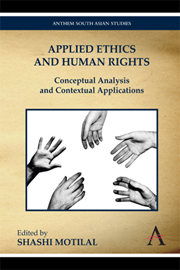Book contents
- Frontmatter
- Contents
- Preface
- Introduction
- Part One Rights, Obligations and Responsibilities
- 1 Applying Ethics: Modes, Motives and Levels of Commitment
- 2 Jurisprudence and the Individual: Bridging the General and the Particular
- 3 Why Moral Relativism Does Not Make Sense
- 4 Human Rights – A Theoretical Foray
- 5 Moral Relativism and Human Rights
- 6 Complicity and Responsibility
- 7 Dharma: The Overriding Principle of Indian Life and Thought
- 8 Moral Foundations of Social Order as Suggested in the Vaiśeṣikasūtras
- 9 Modern Western Conception of Justice as Equality before the Law and Dharmaśāstras
- Part Two Human Rights Issues
- Notes on Contributors
8 - Moral Foundations of Social Order as Suggested in the Vaiśeṣikasūtras
from Part One - Rights, Obligations and Responsibilities
Published online by Cambridge University Press: 05 March 2012
- Frontmatter
- Contents
- Preface
- Introduction
- Part One Rights, Obligations and Responsibilities
- 1 Applying Ethics: Modes, Motives and Levels of Commitment
- 2 Jurisprudence and the Individual: Bridging the General and the Particular
- 3 Why Moral Relativism Does Not Make Sense
- 4 Human Rights – A Theoretical Foray
- 5 Moral Relativism and Human Rights
- 6 Complicity and Responsibility
- 7 Dharma: The Overriding Principle of Indian Life and Thought
- 8 Moral Foundations of Social Order as Suggested in the Vaiśeṣikasūtras
- 9 Modern Western Conception of Justice as Equality before the Law and Dharmaśāstras
- Part Two Human Rights Issues
- Notes on Contributors
Summary
The Vaiśeṣika philosophy of Kaņāda is usually held to be a metaphysical theory. But on closer analysis it becomes clear that this stream of Indian philosophy is very rich in other aspects as well. For instance, the sixth chapter of Kanāda's Vaiśeṣikasūtras deals mainly with moral problems. This chapter is divided into two sections – the first section focuses on morality from social angle while the second is concerned chiefly with the individual ethics. The aim of the present paper is to highlight some socially important moral issues emerging from the first section of the sixth chapter in Vaiśeṣikasūtras. But it must be admitted that the scope of this presentation is very limited in the sense that it does not discuss the Vaiśeṣika in its total perspective and focuses only upon the relevant portion of sutra text from a very specific point of view.
The word ‘Moral’ can etymologically be traced to the word ‘Mores’ (Morals) which means ‘Custom’ and ‘Custom is some regularity of behaviour not of an individual but of a group of individuals in a society’.(Barlingay 1998:35) Therefore when we deal with morality, we have to take into account the individual conduct as in relation to others in group. In other words, morality is fundamentally concerned with social norms since moral acts generally have a bearing upon others.
- Type
- Chapter
- Information
- Applied Ethics and Human RightsConceptual Analysis and Contextual Applications, pp. 101 - 108Publisher: Anthem PressPrint publication year: 2010



